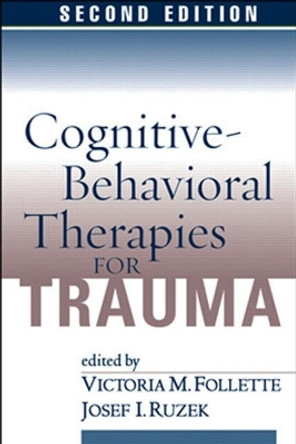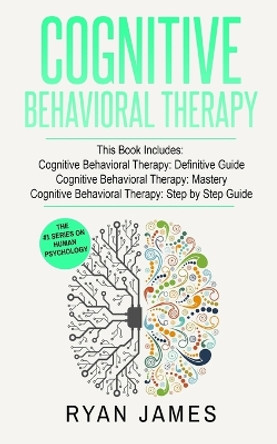Description
This volume presents cutting-edge cognitive and behavioral applications for understanding and treating trauma-related problems in virtually any clinical setting. Leading scientist-practitioners succinctly review the whys, whats, and hows of their respective approaches. Encompassing individual, group, couple, and parent-child treatments, the volume goes beyond the traditionally identified diagnosis of PTSD to include strategies for addressing comorbid substance abuse, traumatic revictimization, complicated grief, acute stress disorder, and more. It also offers crucial guidance on assessment, case conceptualization, and treatment planning.
About the Author
Victoria M. Follette, PhD, is a clinical scientist with a special interest in the etiology and treatment of trauma-related problems. She is Professor of Psychology and Chair of the Department of Psychology at the University of Nevada, Reno. She was named Distinguished Alumna by the Department of Psychology at the University of Memphis, Tennessee, where she received her doctoral degree. Dr. Follette's clinical work is focused on survivors of interpersonal violence, and she examines the use of acceptance-based behavioral therapies in the treatment of this population.
Josef I. Ruzek, PhD, is Director, Dissemination and Training Division, National Center for PTSD, and a psychologist with the VA Palo Alto Health Care System, Palo Alto, California. He received his doctorate in clinical psychology from the State University of New York at Stony Brook. Dr. Ruzek specializes in early intervention for trauma survivors.
Reviews
This book provides a wealth of stimulating and up-to-date ideas for treating trauma and associated conditions, such as emotional dysregulation, guilt, shame, substance abuse, and revictimization. Readers can compare the formulations of leading experts in different forms of trauma therapy, and cannot fail to learn valuable techniques for working with adults, children, couples, and groups. Particularly welcome is the practical focus on managing the more complex problems of clients who have been multiply traumatized, often in childhood.--Chris R. Brewin, PhD, Subdepartment of Clinical Health Psychology, University College London, UK
This is the ultimate resource on treating trauma survivors using CBT. It is the most comprehensive review currently available, covering every indicated cognitive-behavioral intervention and each survivor population, and written by the leaders in the field. I challenge anyone interested in this field to look at the contents--you won't be able to resist buying the book. Updated and reorganized, the second edition offers something for everyone. Clinicians will appreciate the detailed assessment and case formulation guidelines and the well-illustrated clinical techniques. Researchers will find an up-to-date, inclusive review of the literature, and students and teachers will benefit from the breadth and depth of the coverage and the combined wisdom of the experienced authors. Superb!--Barbara O. Rothbaum, PhD, Trauma and Anxiety Recovery Program, Department of Psychiatry and Behavioral Sciences, Emory University School of Medicine; President (2004-2005), International Society for Traumatic Stress Studies
This second edition is an important contribution to the treatment literature. A wide range of cognitive-behavioral interventions for different types of trauma are covered, in chapters written by the treatment developers themselves. The volume is a rich compendium for the therapist who specializes in cognitive-behavioral techniques: perhaps more importantly, it also makes these techniques accessible and understandable to the general practitioner seeking to use CBT because of its growing evidence base. I recommend this text for the professional library of every clinician who treats trauma.--Christine A. Courtois, PhD, private practice, Washington, DC
I've found this to be by far the best book on the market for teaching clinical courses on the assessment and treatment of traumatized populations.--Allen Rubin, PhD, School of Social Work, University of Texas at Austin
- A book such as this is particularly valuable as we begin to recognize the needs of our veterans returning from Iraq and Afghanistan, to cite just one example of the need for training researched and improved treatment for acute stress disorder and post-traumatic stress disorder (PTSD)....The chapters in this extensive volume describe innovative ways to engage patients and help them learn and master needed coping skills; to help them confront feared situations, feelings, and memories; to assist restructuring of maladaptive appraisals and beliefs; to teach development of effective self-care practices; to overcome problems with trust and relationships; and to achieve other necessary goals in treatment....It is the most comprehensive review of CBT currently available. --Bulletin of the Menninger Clinic, 6/8/2007ff A comprehensive, up-to-date, empirically based text which disseminates and applies diverse CBT methodologies across the broad array of PTSD symptoms and clinical areas. This is an important book for any clinician interested in the field of traumatology and/or treating trauma, regardless of clinical or theoretical orientation; it covers a lot of ground and offers an assortment of well-researched, innovative, thoughtful, and compelling treatment methods....Offers a wealth and breadth of some of the latest empirical research in the fields of cognitive psychology and trauma, providing the reader/clinician with many worthwhile hands-on cognitive behavioral tools, realistic case studies, and approaches to apply to the broad range of PTSD psychopathology. This is required reading, re-reading, and referencing for all mental health clinicians, researchers, graduate students, doctoral candidates, and psychiatric residents alike. --Journal of Trauma and Dissociation, 6/8/2007ff A comprehensive handbook of empirically validated treatments for trauma. --PsycCRITIQUES, 6/8/2007ff Written by leading experts in the field, grounded in the latest theory and research, and exhaustive in its breadth and coverage....One of the main strengths of this text is the strong appreciation for individualized case formulation and treatment planning....This text will serve to increase any practitioner's familiarity with the complexity of trauma and the variety of treatment approaches available. --Cognitive Therapy, 6/8/2007
Book Information
ISBN 9781593855888
Author Victoria M. Follette
Format Paperback
Page Count 472
Imprint Guilford Publications
Publisher Guilford Publications
Weight(grams) 758g






